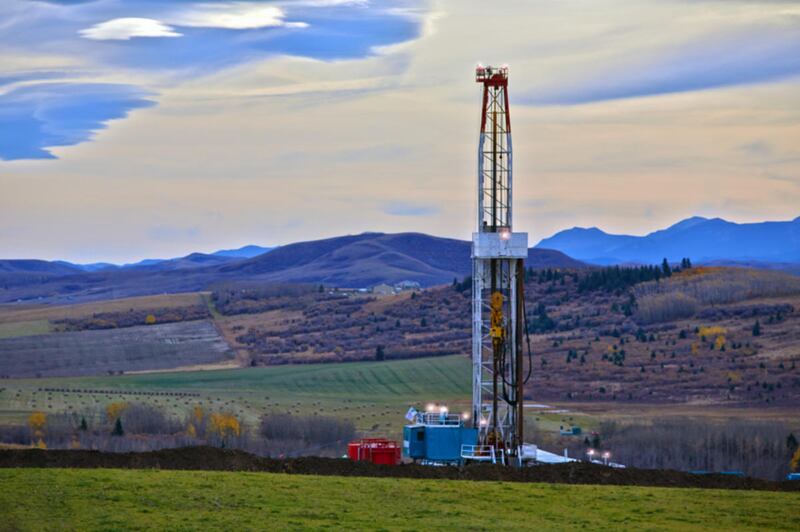SALT LAKE CITY — One of the first and most comprehensive studies of its kind shows that the oil and natural gas boom in the United States produced significant economic benefits for the counties where the drilling happened, and the benefits were amplified in surrounding regions in states by as much as five times.
Performed by the National Bureau of Economic Research, a private, nonprofit and nonpartisan economic research organization, the study released Friday was funded by the National Science Foundation and looked at 3,082 counties over an eight-year period.
Utah was among the group of states in the study, which examined fracking's impacts on employment, income and crime from 2004 to 2012. Researchers examined Bureau of Labor Statistics and IRS data, and pored through 24,646 county year reviews for each industry.
While the study notes that other researchers have probed the effects of the fracking revolution, this research is unique, according to the Dartmouth authors, in that it looked at detailed production values from new wells in each state, the effects that played out during the Great Recession and the economic "spillover" from shocks to the industry.
The study also acknowledges the boom has not been viewed positively in a universal manner, spawning criticism amid fears of water contamination, increases in crime and rural areas being able to shoulder the effects.
Overall, the research said fracking drove a 60 percent increase in this arena of employment, when overall U.S. employment jumped 10 percent during the same time period. The researchers estimate that on a national level, the fracking boom drove an increase of 725,000 jobs and reduced the country's unemployment by a half a percentage point.
Three types of income associated with fracking were analyzed: the wages of workers directly involved in the extraction process through the resource extraction and transportation industries; the landowners who received royalties on the value of production affecting their land; and the impact on wages and employment in other industries not directly related to oil and gas production.
The study showed:
• Each $1 million in new production was associated with a wage increase of $66,000 in the county of origin, with roughly 40 percent of that increase other in non-oil and gas sectors, such as hospitality and finance.
• Within a 100-mile radius, each $1 million in new production was associated with a wage increase of $243,000, with 36 percent of the new "value" showing up in households within commuting distance of the industry activity.
"Several conclusions emerge from our analysis," the study said. "First, the counties where extraction occurs enjoy significant economic benefits. Second, the effects grow larger as we widen the geographic area being examined. The state-level impact on jobs and income is approximately five times as large as the immediate county effect, with most of the impact happening within 100 miles of the drilling sites."
Jeffrey Barrett, deputy director of the Governor's Office of Energy Development, said because fracking is so different from drilling that went on in the 1970s, for example, it not only has a farther geographic reach, but its economics spread wider.
"It is not surprising to me that the impacts would be that big," Barrett said, pointing to study results. "There is a breadth of people on a fracking site."
Barrett said the most recent numbers show the oil and gas industry generated $655 million in state and local tax revenues, and with the exception of Salt Lake County, Uintah and Duchesne counties were at the top for labor income.
Uintah County Commissioner Mike McKee said the fracking boom helped his area weather the economic downturn.
"When the rest of the country was in a recession — I am not saying that we didn't feel some impacts — the Uintah Basin was one of the premier places for low unemployment and high wages," McKee said.
With the nation now awash in near historic supplies of oil and gas, the frenetic economic bounty has taken a sharp turn now punctuated with layoffs, decreased activity and sharply plunging revenues.
"We're certainly not as robust as we were," McKee said. "It is a matter of prices. We are affected by the world price of oil and gas now, but at the end of the day, fracking has opened up the reserves, is more efficient and has certainly helped Utah."
Barrett said wells drilled recently will continue to produce — and Utah will enjoy the benefit — but the price of oil being down by half will deliver significant impacts.
"There will be a major hit, but this is a community out there that has seen this enough times there is a world-weariness factor. We've seen a boom like this, and we have dealt with the down cycle before," he said. "It is never something the counties take lightly, but they've dealt with it and are trying to build in some mitigation."
Joro Walker, an attorney with Western Resource Advocates — an environmental organization opposed to fracking — said the research fell down in that it made no attempt to quantify the adverse impacts that fracking has on the environment.
"First, citing one 4-year-old paper to downplay environmental concerns or avoid addressing the economic, health and environmental impacts of fracking is not convincing," Walker said. "Second, in Utah we know that oil and gas development is causing off-the-charts levels of wintertime pollution.
"This severe impact to the health of Utahns and our environment cannot be written off. Any study of the purported benefits of fracking is not complete without an honest evaluation of the public health and environment costs of fracking," she said.
Email: amyjoi@deseretnews.com
Twitter: amyjoi16


